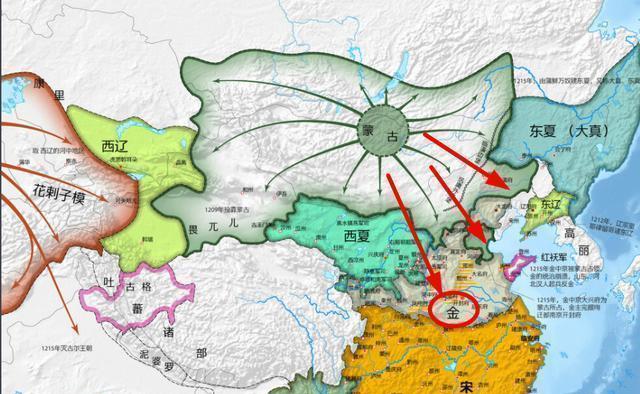China had a Golden State in ancient times, which often had friction with the regime in the Central Plains, and then the Mongol army invaded the Central Plains, and constantly attacked the Jin Kingdom, facing the powerful Mongol army, the soldiers of the Jin Kingdom gradually could not withstand the torture of not being a Mongolian iron horse, so only the fallen country fled, but the remnants of the Jin Dynasty fled in the direction of Henan, why didn't they flee back to their hometown northeast?

My family is on the Songhua River in the northeast, and the impression of this song to outsiders always feels that the people of the northeast love their hometown. However, this is not the case for the Jin people, who must have had indescribable helplessness when they chose to flee to Henan, otherwise people like to fall leaves and return to their roots. In the early days of the attack on the Jin Dynasty, some people looked down on the Mongol army, thinking that they were like a scattered sand, not enough to confront the Jin army, and as a result, as soon as the war began, it quickly made people stunned, and the Jin soldiers were almost vulnerable in front of the Mongolian Iron Horse, and soon lost a large area of territory.
The Mongols spent more than 20 years before and after, constantly attacking the Jin State, although the Jin State has a strong foundation, but also can not withstand the devastation of years of war, and finally Genghis Khan and the Southern Song Dynasty regime alliance, in one fell swoop annexed the Jin State. Afterwards, the elders of the Jin Dynasty were forced to flee, but many people did not understand why they did not return to their hometown of northeast China and went to Henan, which is said to have many complicated factors.
It is said that Mongolia and the Jin Kingdom are enemies of the generations, in 916 AD, liao taizu Yelü Abaoji founded the Khitan and developed to 947, after the Khitan army was strong and strong, began to invade the Central Plains, and then successfully attacked Kaifeng, established itself as emperor, and established the country known as the Great Liao. At this point, the Liao state became stronger and stronger, and did not stop expanding abroad, and the territory of their heyday extended to the Altai Mountains in the west, to the Daxing'an Mountains in the north, to the Japanese sea in the east, and to Hebei in the south.
However, even the most powerful regime was also afraid of infighting, since the Liao civil unrest, the dynasty was not strong, the power was divided and not very united, coupled with the Liao state's policy of "relocating people and abandoning land" in the northeast region, resulting in the Jurchen tribal groups in the northeast region being unregulated, and eventually making the Jurchens rise.
In 1112 AD, when the Emperor of the Liao State was having dinner with some Jurchen tribal leaders, he relied on his power to force the Jurchen leaders to come out and dance, and these leaders were forced by the pressure of the Liao State to not obey, but the yan Akuta resolutely refused during the banquet. Afterwards, these contradictions were finally stimulated, and in the spring of 1114, Wanyan Aku sent troops to rebel against the hegemony of the Liao state, after which the Jurchen tribes responded one after another, and finally the Liao state was destroyed by the Jurchen tribe led by the Jurchen tribe led by the Jurchen tribe under the internal and external disturbances, and the Jurchen tribe led by the Jurchen tribe became the founder of the Jin kingdom.
After the establishment of the Jin Dynasty, it developed rapidly, with a national population of up to 50 million people, nearly 40 times higher than the total population of Mongolia, and the Jin army reached about 1 million, more than ten times higher than the Mongolian Iron Horse. Therefore, the Jin state was once strong and unmatched, and then went south to attack the Northern Song dynasty and capture song qinzong and other two emperors.
In the era of Jin Xizong of the Jin Dynasty, the Jin people were even more powerful, and directly tortured Genghis Khan's ancestor Li Ba Bao to a rebellious hat and nailed it to death on a wooden donkey. Not only that, the Jin Dynasty was afraid of the multiplication of the Mongols, so it inexplicably disappeared the Mongols every three years, causing many Mongols to die for no reason. Since then, the feud between Mongolia and the Jin Dynasty has been formed and continued for generations.
Later, when Genghis Khan rose, it took more than twenty years to eliminate the powerful Jin Dynasty, which was regarded as revenge for the ancestors and the nation. After the defeat, Jin Xuanzong tried to make peace, but he was afraid that the Mongol iron horse would not let the Jin state go, so he insisted on moving the capital to Nanjing. At this time, because the Liao state had long been in civil strife, the various forces in it were intolerable, and the people of the Liao state had long been dissatisfied, so they were very complaining about the Liao Dynasty.
Soon, after Putian Wannu was defeated by the Mongols, he simply betrayed the Jin State in turn, thus establishing a new Dazhen State in the northeast region. Therefore, after the Liao regime in Nanjing had gone, it was impossible to return to the northeast of its hometown, and the only ideal place to escape was Henan.